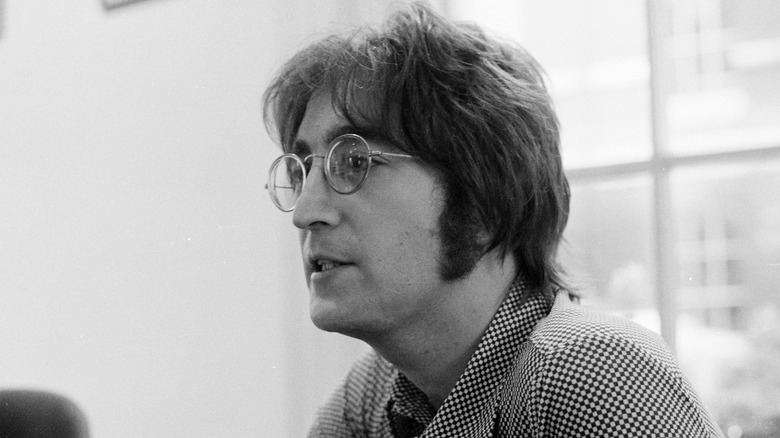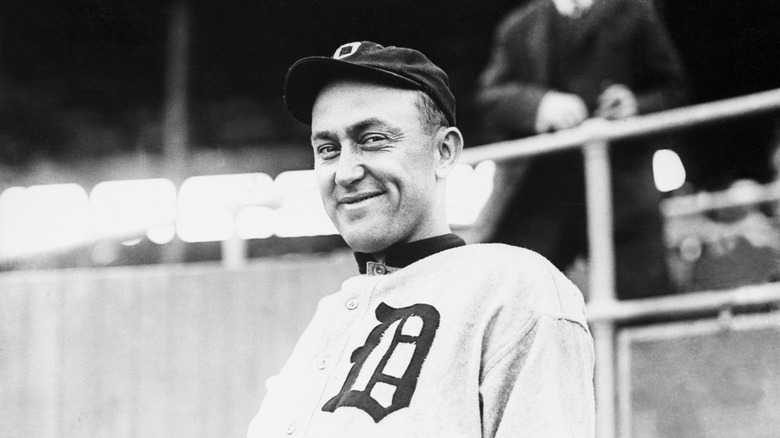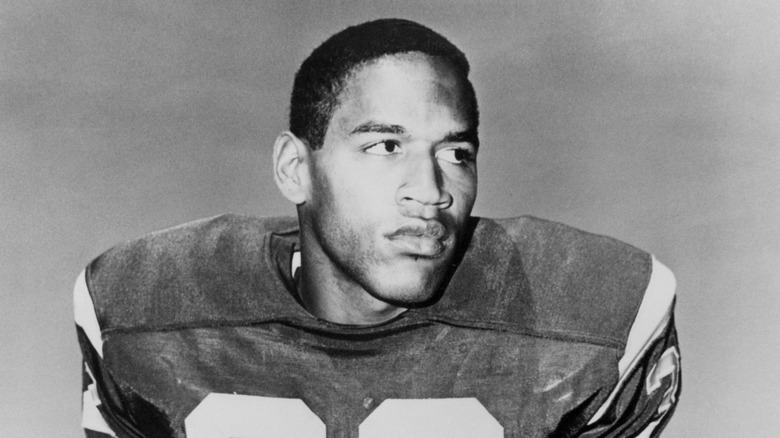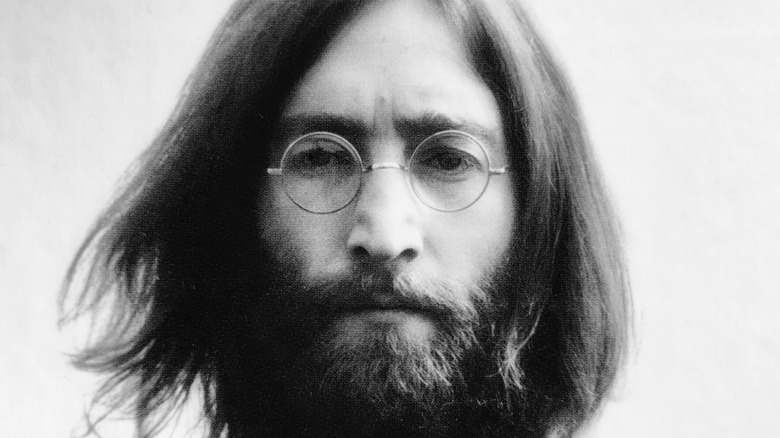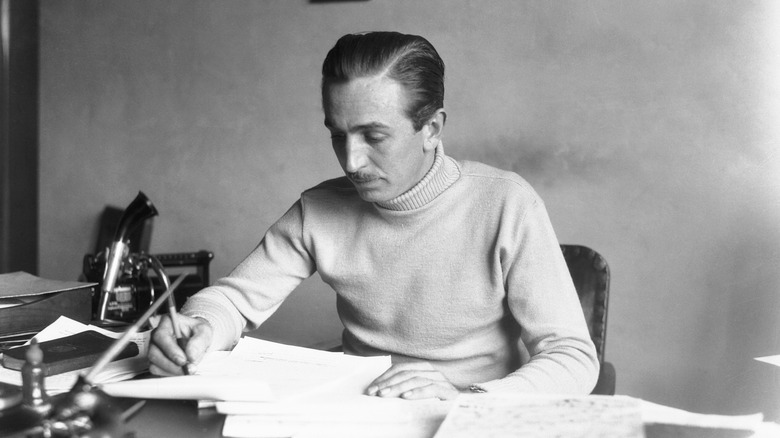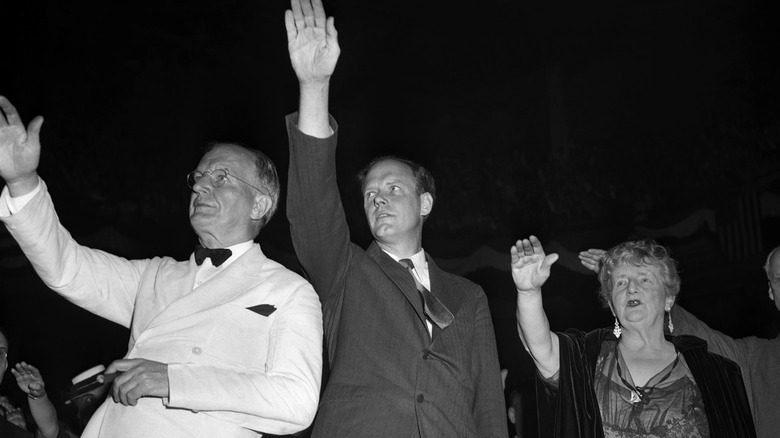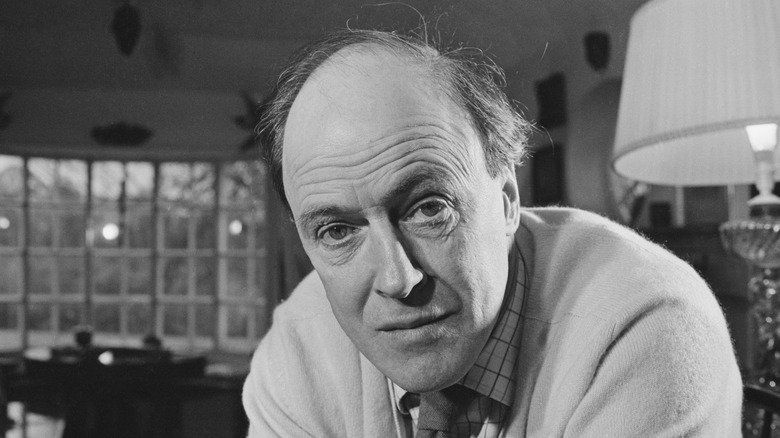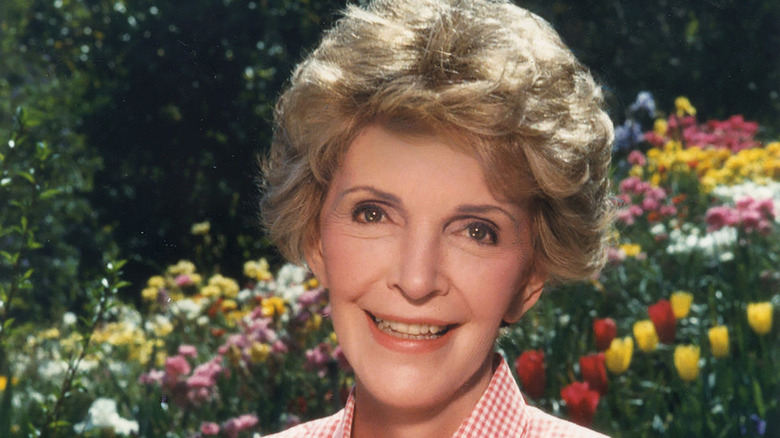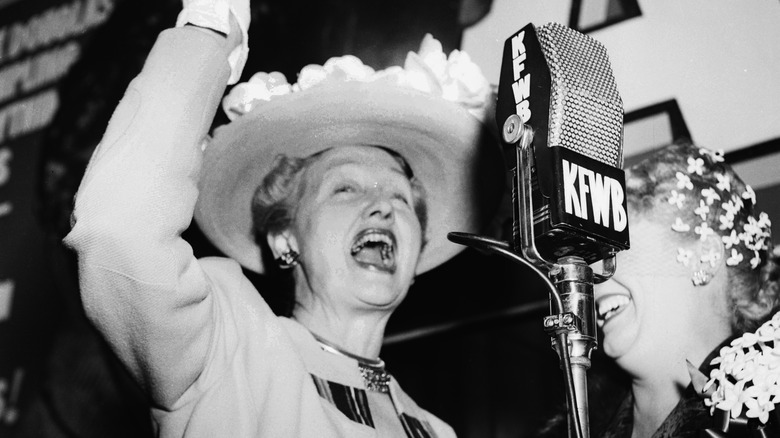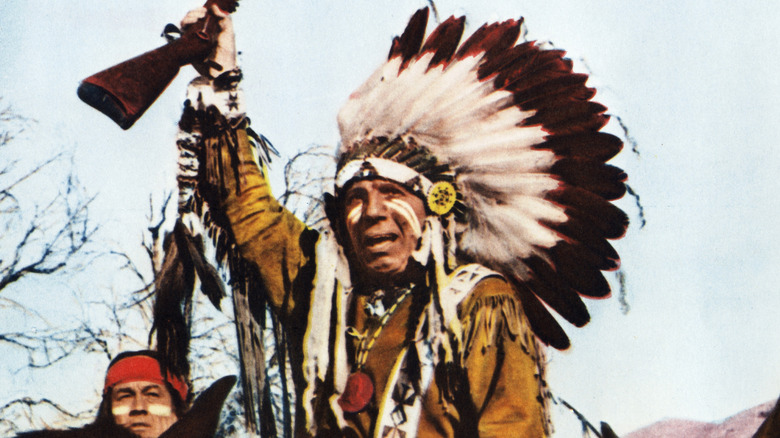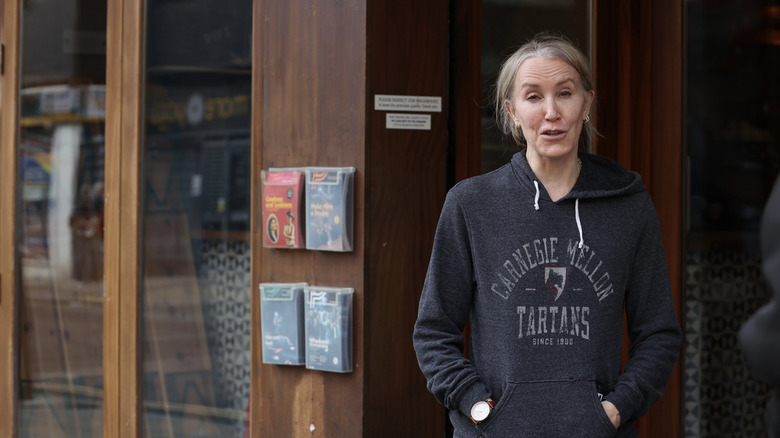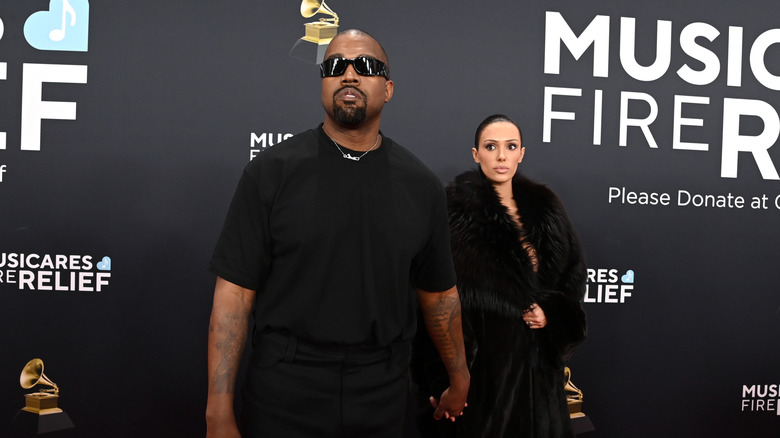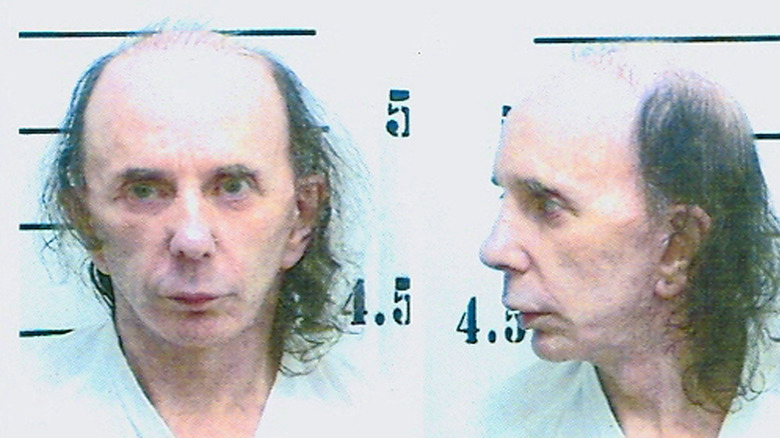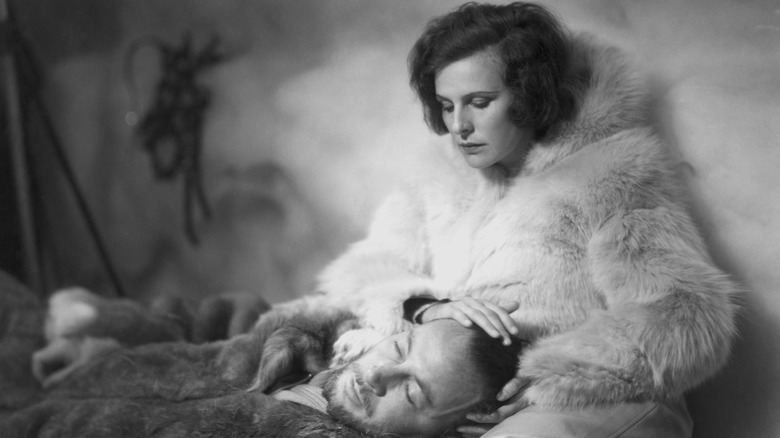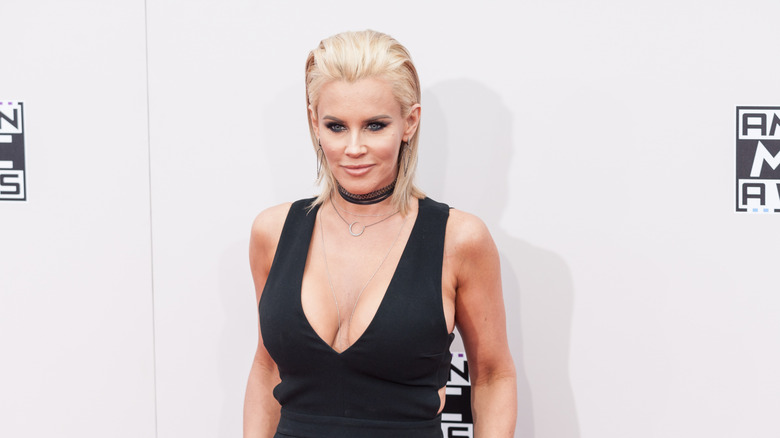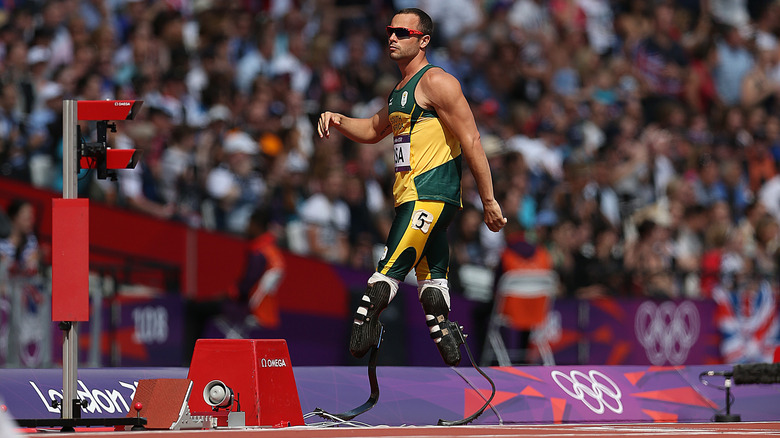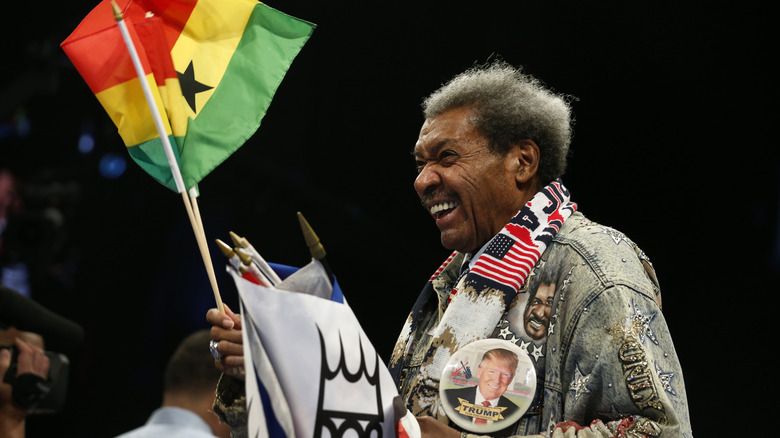Legendary Stars Who Were Actually Horrible People
Fame is not necessarily good for the human soul. Famous people don't go through any particular vetting process before hitting the big screen, landing on the front page, or riding a viral meme to stardom, and so famous people are, ethically, just like the rest of us: some good, some bad, most mixed. Money, praise, and influence do not generally encourage the best parts of a person, and so when modern celebrity culture heaps these all at someone's feet, it's disingenuous to play shocked if the celebrity doesn't go on to be a saintlike figure of goodness and light.
But within the hey-everybody's-human catalogue of celebrity misdeeds, some stand out as especially egregious. Some public figures surpass being merely flawed and show themselves to be crooked, violent, bigoted, nasty, and downright vicious. Separate the author from the work if you can, but don't look at these celebs for moral guidance.
Ty Cobb
A polite way of describing Georgia-born baseball star Ty Cobb would be something like "a proud and intense competitor and a man of his time." A less-polite version might be "brittle, toxic, and mean as a snake, Ty Cobb was a borderline cheat and a frothing racist." Not great baseball card copy, admittedly, but the second descriptor is closer to the truth.
Cobb became famous playing for the Detroit Tigers in the early 1900s. He was lucky he was an excellent athlete: incidents of brawling, including racially based attacks on Black service workers and an attack on a spectator who used a racial slur toward Cobb, might otherwise have been too much for the team to feel like dealing with. On the diamond, he was notorious for having sharpened the spikes on his athletic shoes to have a weapon to rake against other players who got too close. Ironically enough, Cobb's birth state earned him the nickname "the Georgia Peach."
Cobb retired rich, but his money couldn't keep him from drinking to excess or driving away both of his wives. He died of prostate cancer in 1961, having spent the last decades of his life critiquing the skill sets of the generations of baseball players who came after him.
O.J. Simpson
O.J. Simpson represents one of the great American generational divides. Millennials and younger generations remember the murders, the infamous televised chase of Simpson's white Bronco, and the trial (complete with shock acquittal). Older generations remembered a star athlete, occasional movie star, and rental-car pitchman.
For most of his football career, Simpson played for the Buffalo Bills, notching up records for yards gained rushing and most touchdowns in a season. His electric performances gave fans a reason to watch the otherwise lackluster Bills, and this stage presence carried him into a handful of movie and TV roles, as well as a post-retirement gig as a sports commentator.
It all changed in 1994, when Simpson's wife, Nicole Brown Simpson, and her friend Ronald Goldman were found knifed to death in Los Angeles. After a trial closely followed by the public and inflamed with accusations of racial bias, Simpson was found not guilty, a verdict that many observers felt was incorrect. Simpson had abused his wife for years, and any serious doubt about his moral guilt evaporated when he published a sleazy cash-grab book called "If I Did It," meditating on how he might have committed the murders, which he allegedly hadn't, but if he had ... (Goldman's family sued for and won the rights to the book in a civil suit.) Arrested for robbery in 2007, Simpson spent several years in prison before his 2017 parole. He died of cancer in 2024.
John Lennon
John Lennon is the lazy man's favorite musician. Love or hate his work, it's everywhere, both the Beatles oeuvre and Lennon's subsequent solo output. As a product of the '60s and the bestower of the dubious gift "Imagine" to downbeat playlists everywhere, John Lennon has a mostly undeserved peace-and-love reputation undermined by his own admissions.
Lennon cheated on both his wives, though Yoko Ono described his infidelity to her as providing a needed rest. He also struck his son Julian for his allegedly poor table manners when he bothered to be present in the child's life at all. Shortly before his death, he admitted to hitting women in his life and mused on what it would have been like to pursue a physical relationship with his own mother, which he assumed aloud that she would have permitted.
Lennon also badly beat one of his dearest friends for a tasteless but ultimately mild joke about his sexuality. In 1963, after Lennon took a brief vacation in then-Fascist Spain with a gay colleague, Bob Wooler asked Lennon if he'd had a nice honeymoon. Lennon broke Wooler's nose and teeth. It's worth noting that Wooler himself was gay, and reportedly never fully mentally recovered from the assault, which Lennon himself later described as nearly fatal. Fortunately for Lennon's career, he did not have to imagine a world with no consequences: His fame had created one.
Walt Disney
If you grew up in the Western world or with access to its media, Walt Disney's legacy was probably a big part of your childhood. The animation and entertainment juggernaut that has grown out of Disney's work and business is one of the primary producers of media in the world, so a look at the man behind the curtain is necessary, even though it's not a pretty sight.
Disney has a reputation for racism and sexism that is probably fair, even if you make the argument that he was in line with common opinions of his era. Now-shocking depictions of Black- and Jewish-coded characters in older Disney productions have discomfited viewers and the Disney corporation in recent years. And if these depictions simply reflect the failings of contemporary America rather than anything specific about Disney, it's harder to justify his personal welcome of chief Nazi propagandist Leni Riefenstahl to Disney studios in 1938. Riefenstahl's visit, at a time when anti-Jewish violence had already begun in Germany, formed part of a pattern in which Disney ignored anti-Semitism if confronting it would have been professionally inconvenient.
While accusations that Disney was an informant for Joseph McCarthy and his anti-Communist witch hunts have been disputed, he did testify publicly for the House Un-American Activities Committee and redacted scripts to placate McCarthy. We won't ever get to confront him about this, as Disney's head was not actually frozen for later revival but cremated with the rest of him.
Charles Lindbergh
Both Charles Lindbergh's high-flying career and his unattractive personal beliefs have been overshadowed in modern memory by the tragedy of Lindbergh's young son's kidnapping for ransom and subsequent murder. Lindbergh's celebrity made this case one of the major crime stories of the 1930s, but the aviator was also grabbing headlines for his repellent personal views and the star power he used to advance them.
During an extended post-trial stay in Europe, Lindbergh toured various German air defense installations, in part to report to the U.S. government. In October 1938, the some month as Nazi Germany's initial land grab from Czechoslovakia, Lindbergh accepted a medal from Herman Göring. Convinced of German victory in the likely war, Lindy skittered back to the United States and spent the next couple of years arguing for isolationism, blaming Jews for working to drag the United States into the war. Pearl Harbor finally shut him up, and he later advised the Air Force in the Pacific Theater.
Lindbergh was also an avid eugenicist, firmly convinced in the superiority of certain races and the ability of science to preserve an imagined purity of blood. Lindbergh's admittedly fruitful collaborations with medical experts in the hope of helping an ailing sister were, he hoped, to be extended and built upon to eventually produce immortality ... but only to white people.
Roald Dahl
Never Google anyone whose work you love. Roald Dahl's children's works are a beloved whirl of giant peaches, friendly giants, amusingly dangerous factories, and telekinesis; his adult stories are darker and more sardonic, the perfect work for young fans to age into. Unfortunately, the hand holding the pen belonged to a racist and philanderer who never bothered to apologize.
Promiscuous and unkind, Dahl left a trail of broken hearts before and during his marriage to actress Patricia Neal; the last straw for Neal, and their marriage, was his affair with one of their closest friends. Dahl's initial description of the Oompa-Loompas of chocolate family fame made them seem much more like enslaved African people than later, softened incarnations, and the Big Friendly Giant was originally written as the Big Friendly Giant Collection of Anti-Black Sterotypes.
Dahl's real ire was saved for Jews, despite his participation in World War II on the Allied side. In interviews late in his life, he appeared to conflate Jews with Israel, repeated dry old canards about Jewish control of financial and media institutions, and flatly described himself as an anti-Semite. He even went so far as to blame Jews themselves for the long history of anti-Semitism, musing that there must be something about the Jewish people that inspired the centuries of oppression. This look-at-how-they-were-dressed victim-blaming critique was among Dahl's final public words on the topic.
Nancy Reagan
In a certain light, Nancy Reagan was an ideal First Lady. Vaguely pretty, mildly famous in her own right from her own film career, and a devoted helpmate to husband Ronald, she picked a relatively non-controversial pet issue, "just saying no" to drugs, and if she was a little bit woo-woo about astrology, it didn't seem like the most harmful eccentricity for a politician's wife.
Unfortunately, Nancy Reagan's ostensibly inoffensive public face concealed the reality of a woman able and willing to betray her old friends when their association with her became inconvenient. Reagan's husband was president during the first years of the AIDS crisis, and by 1985, over many thousands of Americans had died of the emerging disease. The Reagan administration was criticized at the time and continues to be blamed for inaction during the first years of the epidemic, since the gay men who were the illness's most prominent victims were not considered "important."
The Hollywood Reagans had been friends with Rock Hudson in California, and when Hudson was denied entry to a French hospital for an experimental AIDS treatment, he asked his old friend Nancy to intervene, acting on a hint that a nudge from someone highly placed might change the hospital director's mind. Reagan received his telegram but did not help him, citing a reluctance to play favorites that critics say was selectively enforced, pointing to the Reagans' collaborations with Bob Hope. Hudson was ultimately admitted to the hospital, but the disease had progressed too far, and he died several months later. Reagan's husband would not address the issue publicly until mid-1987, when tens of thousands more Americans had died.
Hedda Hopper
A small-time actress who graduated into a Hollywood gossip columnist, at her zenith Hedda Hopper was known for her grand and towering hats and her razor-edged pen, which she used to attack anyone she disliked. With a particular animus against gay people and people she thought were communists, Hopper briefly had the power to send performers and projects she disliked to "Hedda Hell," turning public perception negative with her venomous ink.
Hopper particularly enjoyed dropping hints about Cary Grant, who was widely suspected of having a romantic attachment to his friend and fellow actor Randolph Scott, but she would turn on anyone. As her gossip columnist became an outlet for moralistic and anti-Communist hysteria, she flayed classic figures like Charlie Chaplin and Ingrid Bergman. She only spared Lucille Ball, who had registered to vote as a Communist as a young woman, because they were personal friends, with Hopper even appearing on an episode of " I Love Lucy."
To her limited credit, Hopper did not pretend to be better than she was. When confronted by actress Merle Oberon about her toxic pen, Hopper copped to a simple love of cruelty.
Aaron Hernandez
Aaron Hernandez seemed to have it all: The handsome football player was such a gifted athlete that he was able to skip his senior year at the University of Florida and be chosen in the fourth round of the 2010 NFL draft by the juggernaut New England Patriots. He played well enough to nab a $40 million contract extension in 2012, but the following year, the wheels began to come off.
In June 2013, an acquaintance of Hernandez's named Odin Lloyd was shot to death, and witnesses placed Hernandez as one of the last people to see Lloyd alive. Hernandez was quickly arrested in connection with Lloyd's murder, and a jailhouse assault charge complicated his legal situation. Hernandez was later also charged in connection with the murders of two Cape Verdean immigrants in 2012; he was convicted for Lloyd's death in 2015 but acquitted of those of the Cape Verdeans, Daniel de Abreu and Safiro Furtado, in 2017.
Facing a sentence of life without parole, Hernandez died by suicide in his cell in April 2017, shortly after the acquittal. Subsequent to his death, his family announced plans to send his brain for research into chronic traumatic encephalopathy, a brain disease resulting from repeated trauma common in NFL players. Further postmortem revelations centered on allegations of abuse Hernandez both suffered and witnessed as a child, and speculated that Hernandez's troubles stemmed in part from his inability to accept his own homosexuality.
Iron Eyes Cody
Iron Eyes Cody played a Native American in some 100 film and TV roles over the course of his decades-long career. In movies as varied as "Murders in the Rue Morgue" and "Ernest Goes to Camp," Cody racked up a prolific but monotonous slew of credits, often credited as "Indian," "Shaman," "Medicine Man," or similar. Readers of a certain vintage or dedication to classic TV will even recognize him as the "Crying Indian" from a famous anti-littering commercial in the early '70s, a well-intentioned but misguided commercial predicated on the idea that stolen land should at least be kept pretty.
In the mid-'90s, near the end of Cody's life, reporters discovered that the olive skin and strong features that had boosted his Native bona fides and helped him build a career came from Sicily, and that Cody had no detectable Native ancestry, even though his wife, Bertha Parker, was Indigenous, as were their adopted sons. Cody denied these revelations until his death, and today the legacy of one of Hollywood's most productive Pretendians includes stars on the walks of fame in both Hollywood and Palm Springs.
Felicity Huffman
Fraud is not the worst crime imaginable, but it's far from a good look, especially when carried out by a privileged and celebrated actress who should have plenty of money to send her daughter to college. In 2019, Felicity Huffman was one of the biggest names caught up in the Operation Varsity Blues scandal, in which a college counselor named Rick Singer adjusted answers on SAT takers' paperwork in order for them to achieve better scores, and therefore more attractive college placements. The sum of $15,000 bought Huffman's daughter a better SAT score, but also led to fines, jail time, and ignominy for Huffman herself.
Huffman pleaded guilty to a mail fraud charge and was fined $30,000, spent 14 days in jail, and submitted to a year of supervised release: not the harshest punishment in the world, but a fall from grace for the once-admired actress. In a subsequent NBC interview, Huffman described herself as feeling like a bad mother if she didn't pursue the scam, while also noting — accurately but in a weird non-sequitur — that Black and brown people are disproportionately subject to police raids like the one carried out at Huffman's home.
Huffman's daughter, who did not know about the funny business, was ultimately accepted at Carnegie Mellon. The $45,000 Huffman blew on scams and fines might have helped pay for it.
Kanye West
In the mid-2020's, for reasons that remain unclear, American rap star Kanye West pretty much came out as a Nazi. After years of anti-Semitic comments that led to Adidas cutting ties in 2022, West leaned even further into his new national socialist look in early 2025. In February of that year, he went on a shockingly anti-Semitic tear on X (formerly known as Twitter), after which his account was deactivated, and promoted and sold white T-shirts adorned only with a swastika under his fashion label, Yeezy. (The brand's site also went offline.) In May 2025, on the anniversary of Nazi Germany's surrender in World War II, West released a song called "Heil Hitler," comprising weird racial imagery, complaints about West's ex-wife Kim Kardashian, and a snippet from an actual Hitler speech.
At the risk of stating the obvious: Kanye West is Black. While Black people did not suffer the same organized slaughter in Nazi-controlled Europe that targeted other groups, they were by no means treated equally to their racially "acceptable" neighbors, suffering forced labor and instances of compulsory sterilization. They were excluded or expelled from certain professions and often faced street harassment under the Nazi regime. Singled out for particularly poor treatment were the "Rhineland bastards," mixed-race children of German mothers and non-white fathers who met during the post-World War I Allied occupation of the German Rhineland. West's own children are of Black and European descent, but this seems not to concern him.
Eric Clapton
Enoch Powell is not a widely remembered name in the modern day, but in the late 1960s and 1970s, the British politician was the face of English xenophobia. After giving an anti-immigrant statement later called the "Rivers of Blood" speech, Powell was booted from the British conservative party, but not before his warning that in the near future "the black man will have the whip hand over the white man" divided British public opinion. One of the figures to throw in with Powell's preference for a white England was rock star Eric Clapton.
During a 1976 concert in Birmingham, United Kingdom, Clapton, misunderstanding what the crowd had paid to see, stopped the music to deliver a rant against immigration and in favor of Powell, peppering his "arguments" liberally with racial slurs and charming exclamations like "keep Britain white" and "get them all out." Perhaps having been reminded of who invented the blues, a sorry-not-sorry apology followed in which Clapton pointed out that he had even dated a Black woman, but Clapton has remained influential and successful despite this well-documented outburst.
Clapton also admitted in later years to the domestic abuse of his wife during the same period, when his drug and alcohol use was uncontrolled. Now clean, Clapton has referred to his alcoholism as a gift: It's difficult to imagine his ex-wife coming to the same sunny interpretation.
Phil Spector
Phil Spector, the unfortunately malign genius behind the paradigm-shifting Wall of Sound music production technique, landed on most people's "Bad Celebrity" lists when he murdered actress Lana Clarkson in his home in 2003. Spector's defense, that a woman he had just met had died by suicide in a near-stranger's house, was not borne out by forensics, Clarkson's personality, or common sense. He was sentenced to 19 years to life, serving 13 before dying of COVID in early 2021.
Clarkson wasn't the only woman Spector victimized, just the last and least fortunate. In 1968, he married Veronica Bennett (who performed most of her career as Ronnie Spector), who was a member of the smash-hit girl group The Ronettes, and subjected her to horrific abuse before her 1972 escape. Spector threatened his wife with guns and kept a coffin for her in the basement, later repeating the confinement he had subjected her to with their adopted children. The spiteful Spector even wasted time during his murder trial trying to keep Ronnie out of the Rock n' Roll Hall of Fame, an absurd project given Ronnie Spector's stardom and the bigger issues Spector faced. In a more fortunate turn of events, Ronnie both made it into the Rock n' Roll Hall of Fame and outlived her ex-husband.
Leni Riefenstahl
Leni Riefenstahl was the only independently important woman in the Nazi regime, prominent because of her own actions and not her connection to a man. A physically beautiful actor and dancer who became an admittedly highly gifted director, Riefenstahl created much of the Nazi regime's aesthetic. After the war, she largely escaped censure: She had never formally joined the Nazi party, and, like many others, claimed that she simply hadn't known of all the atrocities going on. She was an artist, not a criminal, according to her carefully stage-managed myth — and after all, she was just following orders!
She lied, of course. Riefenstahl knew the Holocaust and its connected horrors were happening. Riefenstahl used interned children as extras and had Jews taken out of the background of a shot; it is not credible that she did not know these Jews were immediately murdered. She followed the invasion of Poland to make a propaganda film, balking not because of the sinister nature of the task but because ruined Poland wasn't a good set for the kind of picture she liked to make.
Riefenstahl spent her long post-war life revising her memoirs and working as a still photographer, with a noted body of work capturing tribal people in Sudan. When Jodie Foster almost played her in a biopic, Riefenstahl demanded a prettier actress, although the project failed to appeal to Sharon Stone, Riefenstahl's choice. She died in 2003 at the age of 101.
Gwyneth Paltrow
Under most circumstances, if you sell products while lying about what they can do, you receive legal repercussions and ridicule. Unfortunately, if you're a movie star, you just get richer. Gwyneth Paltrow has pivoted from giving middling performances in big-screen blockbusters to selling lies through her lifestyle brand, unappealingly named Goop.
Among other expensive and ineffective items, Paltrow has sold stickers that she alleges rebalance the energy in the body; her flatly untrue claim that they used NASA technology prompted a rebuttal from the space agency itself. She also got into the even more dubious crystal space, culminating in her notorious jade egg designed to be inserted into an orifice in order to address disorders. While Paltrow has received censure from various bodies for fraud, she's continued to charge ahead, hiding behind claims that Goop is simply opening conversations and claiming that the backlash is because she's attractive.
Jenny McCarthy
Before Robert Kennedy Jr. arrived on the scene, one of the most prominent anti-vaccine activists in the United States was actress and general TV personality Jenny McCarthy. After McCarthy's 2 1/2-year-old son was diagnosed with autism, McCarthy claimed to have "recovered" him from the disorder, which she argued was partly due to the vaccine against measles, mumps, and rubella that forms a normal part of the childhood vaccination schedule. Her ostensible trick? A gluten- and dairy-free diet.
McCarthy's activism is part of an overall turn against vaccination that has permitted preventable diseases to return to the United States. In a Frontline interview, McCarthy said she would rather her child have measles (sometimes disabling and occasionally fatal) than autism (sometimes disabling and not fatal). She went on to dismiss concerns about medically fragile children exposed to germs from their unvaccinated peers, saying that conversations needed to occur within individual play groups.
McCarthy and her fellow travelers in the anti-vaccine movement have been accused of an ableist slant that discounts autistic lives as less valuable than others. While some people understand autism as a disorder and others position it as a simple variation in the human experience, McCarthy's intense activism to "save" people from autism has a distinct eugenicist whiff. Finally, it's worth noting time and again that the original study linking vaccination to autism was discredited, and its primary author had his medical license yanked.
Mark Wahlberg
During the 1980s, before his bare torso served as an awakening for a generation of Americans, Mark Wahlberg was a small-time street hood who came to the law's attention after a series of racially motivated attacks. In 1986, Wahlberg and friends threw rocks at some younger Black girls, striking one, while shouting violent threats that included racial slurs. The charges were dropped the following year, leaving Wahlberg free to commit even worse crimes.
In 1988, an intoxicated Wahlberg again brayed racial slurs while attacking two Vietnamese men, blinding one of them in one eye with a punch. He continued to spew anti-Asian racism after police arrived, and he was ultimately convicted of the assaults and sentenced to two years in prison. Wahlberg would ultimately only spend a few weeks behind bars for the racial violence.
In 2014, having apparently not retained the services of a publicist who could have told him what a terrible idea it was, Wahlberg applied for a pardon for the attacks. After pushback, he apologized feebly, claiming that he had spent 28 years making up for the crimes and that he did not want to go through the unpleasantness again, an angle that implies that Wahlberg does not understand who the victims are in this situation. The motion for pardon was opposed by his victims and their families, and Wahlberg ultimately dropped the bid.
Oscar Pistorius
South African runner Oscar Pistorius was an inspiration until he murdered his girlfriend. His lower legs were amputated when he was an infant due to congenital malformations, but Pistorius quite literally did not let that slow him down. Relying on bladelike prostheses, Pistorius went to first the Paralympics and then the non-para Olympics, earning the nickname "the fastest man on no legs" for his athletic ability. He also won recognition for the scrappiness that led him to fight for and secure the right to compete against runners without disabilities.
Just a few months after his appearance in the 2012 Olympics, Pistorius shot and killed Reeva Steenkamp, firing through the door of the bathroom in which she had locked herself. Pistorius claimed to have thought she was a burglar and, in a long legal saga, was convicted of manslaughter, had the conviction quashed, and was then convicted of murder. Modern South Africa's generous parole laws meant that Pistorius spent only about seven years in jail, done in two stints due to the complexity of the legal decisions; now on the outside, he may not drink alcohol and must continue therapy focused on gender-based violence.
Don King
You might be forgiven for having thought of Don King as more meme than man. The eccentric and big-haired boxing impresario was famous for his skill at making fighters big, having graduated from running numbers in Cleveland as a younger man, and used his fame to take weird side quests like trying to unite the two Koreas through the healing power of boxing. But before he rode Muhammad Ali's star to his own fame and collaborated with then-Zaire's dictator to bring a fight to the African nation (now the Democratic Republic of the Congo), King beat one of his own employees to death.
A man named Sam Garrett was fresh out of prison and began collecting money for King's numbers game. King realized Garrett was skimming money, and during the ensuing altercation, Garrett's head slammed into the concrete, killing him several days later. In a self-serving interview with The New York Times, King cited Freud and described the beatdown as "the frustrations of the ghetto expressing themselves." He did not express any apparent remorse for Garrett's death, but did talk about how much he enjoyed reading the classics in prison.
If you or anyone you know needs help with addiction issues, may be the victim of child abuse, is dealing with domestic abuse, has experienced a hate crime, or is struggling or in crisis, contact the relevant resources below:
-
The Substance Abuse and Mental Health Services Administration website or contact SAMHSA's National Helpline at 1-800-662-HELP (4357).
-
The Childhelp National Child Abuse Hotline at 1-800-4-A-Child (1-800-422-4453) or contact their live chat services.
-
The National Domestic Violence Hotline at 1−800−799−7233. You can also find more information, resources, and support at their website.
-
The VictimConnect Hotline by phone at 1-855-4-VICTIM or by chat for more information or assistance in locating services to help. If you or a loved one are in immediate danger, call 911.
-
Call or text 988 or chat 988lifeline.org
